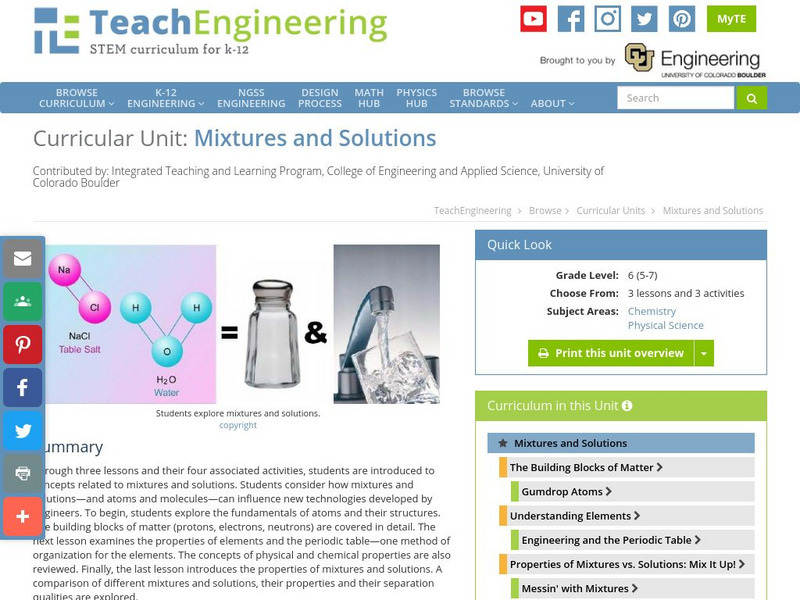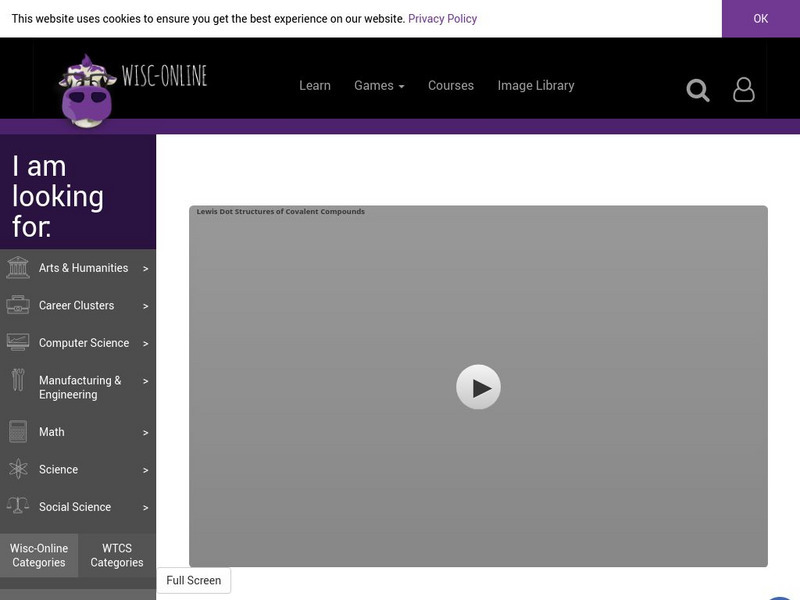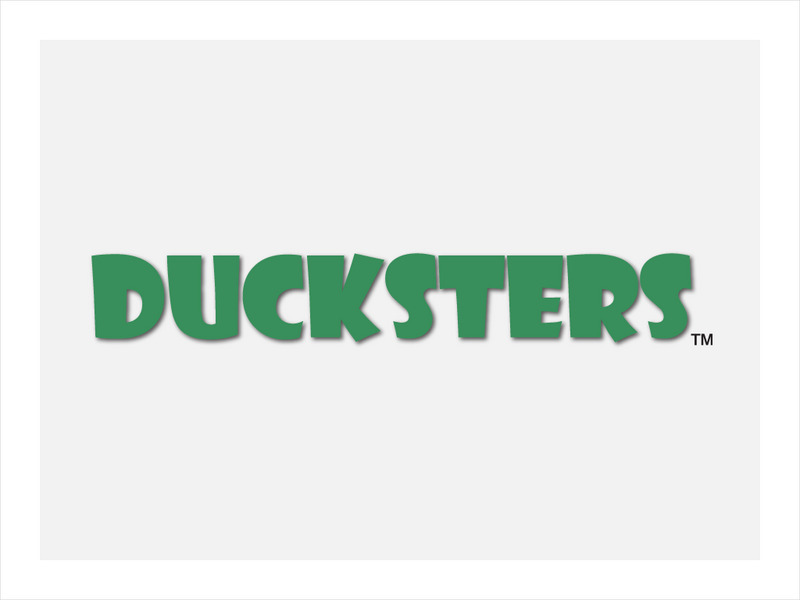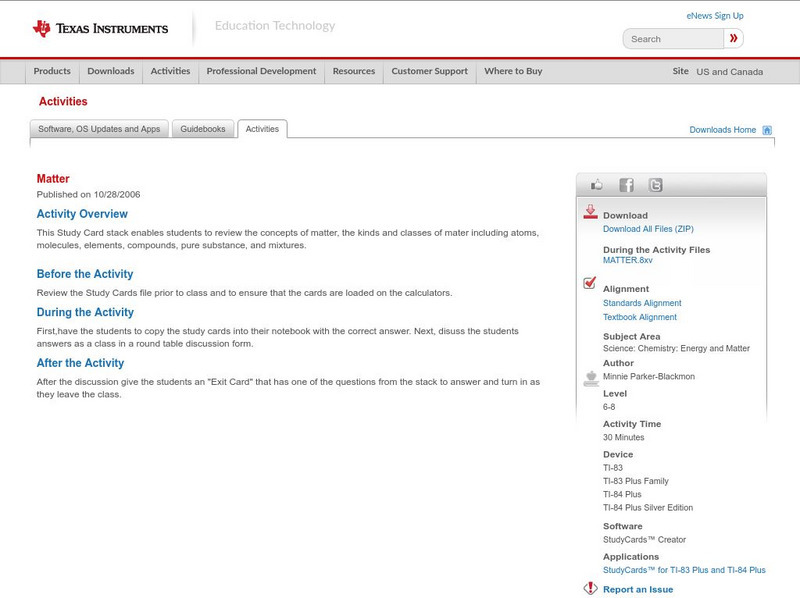Concord Consortium
Concord Consortium: Stem Resources: Spectroscopy
Web-based activity walks learners through the use of spectroscopy in determining the identity of atoms and molecules by defining the excited state of atoms, the frequencies of emitted photons, and atoms' ability to absorb them....
Museum of Science
The Atom's Family: Phases of Matter
Help the Phantom choose a material and observe the changes at different temperatures in the molecule chamber. What happens to the elements or molecules as the temperature changes?
Simon Fraser University
Chem1 Virtual Textbook: Chemical Composition
Chemical composition is a section of a larger overview on Chemistry, covering a variety of aspects. This section focuses on elements, atoms, compounds, and structure. Examples, formulas, and pictures are provided.
Other
University of Kansas: Quarked!: Matter Mechanic
Build elements and molecules using neutrons, protons, and electrons. Choices include helium, carbon, oxygen, aluminum, water, and salt.
CK-12 Foundation
Ck 12: Fifth Grade Science: Physical Science: Types of Matter
[Free Registration/Login may be required to access all resource tools.] Discusses elements, atoms, compounds, molecules, and crystals. Looks at mixture and different types of them.
TeachEngineering
Teach Engineering: Mixtures and Solutions
This unit covers introductory concepts of mixtures and solutions. Students think about how mixtures and solutions, and atoms and molecules can influence new technologies developed by engineers. The first lesson explores the fundamentals...
Wisc-Online
Wisc Online: Lewis Dot Structures of Covalent Compounds
Short slide show provides basic information about drawing Lewis dot structures for covalent compounds. Starts with anatomy of the atom, and then shows the relationship between atomic particles and the Periodic Table of Elements. Offers...
ClassFlow
Class Flow: What Is Matter?
[Free Registration/Login Required] Discover the composition of matter and the relationship between matter, atoms, and elements. Students will learn the differences between elements and compounds, and how molecules are formed. Chemical...
Ducksters
Ducksters: Chemistry for Kids: Chemical Bonding
Study chemical bonding in chemistry including atoms, valence electrons, ionic and covalent bonding, and how molecules are formed on this site!
Ducksters
Ducksters: Chemistry for Kids: Organic Chemistry
Kids learn about organic chemistry including the importance of carbon, organic molecules, compounds, hydrocarbons, synthesis, and functional groups.
Texas Instruments
Texas Instruments: Matter
This Study Card stack enables students to review the concepts of matter, the kinds and classes of mater including atoms, molecules, elements, compounds, pure substance, and mixtures.
American Chemical Society
American Chemical Society: Hompage
ChemCenter, available from the American Chemical Society, provides chemistry news, reference sources and other public services.
Georgia Department of Education
Ga Virtual Learning: Ap Chemistry: Welcome
An introduction to the College Board's AP Chemistry course, which is designed to be equivalent to a first year college chemistry course.
TED Talks
Ted: Ted Ed: What Is the Universe Made Of?
The atoms around you have existed for billions of years- and most originated in the flaming, gaseous core of a star. Dennis Wildfogel tells the captivating tale of these atoms' long journeys from the Big Bang to the molecules they form...
CK-12 Foundation
Ck 12: Chemistry Simulation: Air Matters
[Free Registration/Login Required] Explore the composition of air and learn about the different atoms and molecules that we breathe every day.
Other
Science Alive: Synthetic vs. Natural: What's the Difference?
Through this reading, young scholars will learn that a substance's properties arise from its molecular structure, not from how it's made (i.e., synthesized by people or found in nature). There is no fundamental difference between natural...
Sophia Learning
Sophia: Characteristics of Matter
Find out the basic characteristics and main properties of all matter.
ClassFlow
Class Flow: Comparing and Contrasting Matter
[Free Registration/Login Required] This flipchart is a guided activity to help students compare different types of matter: atoms and molecules, elements and compounds, mixtures and solutions. It corresponds to Virginia science SOL 5.4.
Other
Science Alive: What Is Organic Chemistry?
This reading/lesson plan introduces young scholars to the concept of organic chemistry.
Other
Science Alive: The Many Faces of Steroids
This reading is an introduction to the great variety of steroids and their many different uses.
















